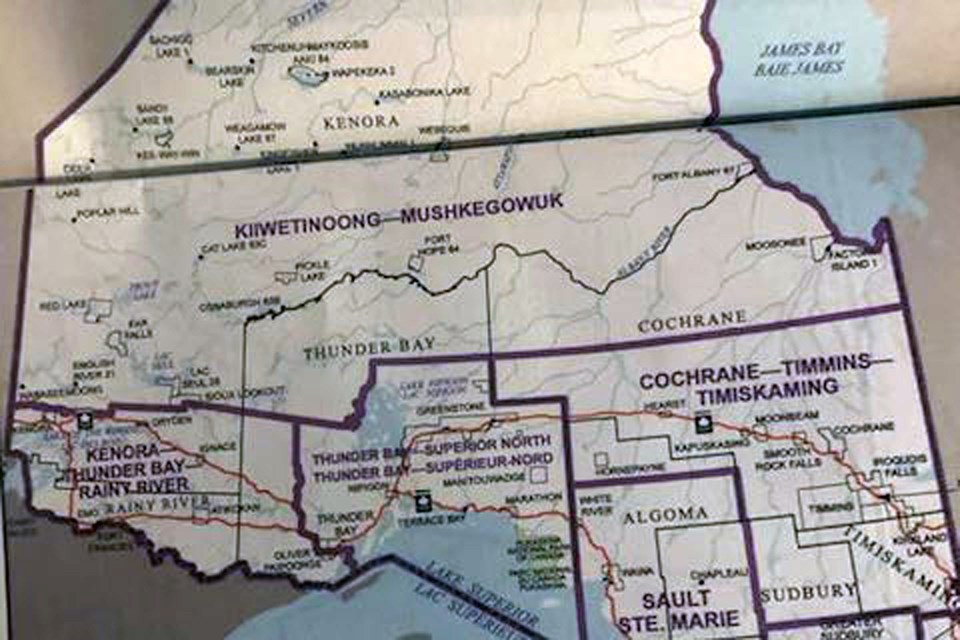THUNDER BAY — The Federal Electoral Boundaries Commission is being asked to consider creating a separate, single urban riding encompassing the City of Thunder Bay.
The suggestion comes in a resolution passed Monday night by Fort Frances town council.
Councillor Doug Judson feels it's a way to overcome the urban/rural split that already exists and which would be exacerbated under the commission's current proposal to realign riding boundaries in Northern Ontario while cutting the region's representation from 10 MPs to nine.
The draft plan would see the southern portion of the existing Kenora riding – including the cities of Kenora and Dryden – added to the existing Thunder Bay-Rainy River riding.
"We are very much outweighed by a large urban centre to our east," Judson says.
"Before 2003, we had Thunder Bay-Atikokan, Kenora-Rainy River and Thunder Bay-Superior North. I think there's a strong sense in the Kenora and Rainy River districts that as we're looking at a significant reconfiguration of the riding, we should consider whether effective representation requires that we separate larger urban centres from smaller or more rural areas," he said in an interview Tuesday.
Judson said this would ensure that "everyone is able to have sufficient and appropriate political influence."
He said there have been recent examples of communities such as Fort Frances "losing out" to other communities in the riding that are very different, adding "I think that's the thinking and the feeling that you will find in many of the communities in the Kenora and Rainy River districts."
The Fort Frances resolution states that combining the main population centres of the current Kenora and Thunder Bay-Rainy River ridings will further erode effective representation for rural and outlying areas.
It also notes that all 10 current Northern Ontario MPs representing three parties have criticized the commission's proposal as impractical and unfair.
Judson said the commission has already identified the need to consider exceptional circumstances in the Far North, where it proposes to create a riding with only 36,000 people.
"I would suggest that whether there are other ridings that also need to have exceptional circumstances ought to be on the table. The Supreme Court has told us...there is no entitlement to equality of parity of voting power. The requirement is that the ridings be sliced up so that people have effective representation, and that's the wording I've used in the resolution."
He said that on that basis, riding boundaries across Northern Ontario should take into account not just raw population data but also cultural, historical and political distinctions, Indigenous treaty boundaries, and minority groups such as Francophone communities.
Judson expressed optimism that the feedback to the commission from across the North will be a fairly unified message that "we are not happy with the proposal, and they need to go back to the drawing board."
Thunder Bay Mayor Bill Mauro, though, has reservations about the idea of creating an urban riding for Thunder Bay and splitting it off from district communities in the existing ridings of Thunder Bay-Rainy River and Thunder Bay Superior North.
"Clearly the city of Thunder Bay would be unlikely to be willing to give up one representative because that's what's being recommended by the Fort Frances resolution. I don't think people in the city would think that to be a good idea," Mauro told TBnewswatch.
He also said it's unclear how much of the rural parts of Thunder Bay-Rainy River and Thunder Bay-Superior North would remain attached to the proposed single new urban riding.
"You could suggest, not knowing the detail, that they might actually be creating a riding that would be very difficult to represent."
While expressing doubts about the support this particular idea would receive in Thunder Bay, the mayor said he does understand why people across the Northwest are concerned about the changes proposed by the electoral boundaries commission.
Thunder Bay city council passed its own resolution about the issue on Monday night.
